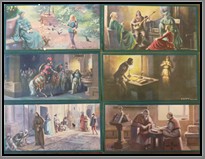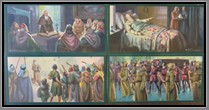Spanish Civil War /History
 SCW 2491925 poster tribute to Miguel Primo de Rivera. Size: 46 x 63 cm. M
SCW 2491925 poster tribute to Miguel Primo de Rivera. Size: 46 x 63 cm. M
Note: Don Miguel Primo de Rivera y Orbaneja, 2nd Marquis of Estella, 22nd Count of Sobremonte, Knight of Calatrava (January 8, 1870 – March 16, 1930) was a dictator, aristocrat, and military officer who served as Prime Minister from 1923 to 1930 during Spain's Restoration era. He deeply believed that it was the politicians who had ruined Spain and that governing without them he could restore the nation. His slogan was "Country, Religion, Monarchy." Historians depict him as an inept dictator who lacked clear ideas and political acumen, and who alienated his potential supporters such as the army. He did not create a base of support among the voters, and depended instead on elite elements. His actions discredited the king and ruined the monarchy, while heightening social tensions that led in 1936 to a full-scale Spanish Civil War.
Price: $690.00
Archive of the Falange Infantry Regiment La Victoria No. 28, 169th Battalion from 1938-1939. It is a record o requisitions and disbursements and correspondence of the unit. Stacked up, the archive is 20cm high. There are thousands of pages. This is a rare look into how a fascist unit sustained itself in the field and offers the opportunity to track the movements and needs of the unit over time. The files are stored in monthly envelopes for the main. These archives are usually broken up and documents sold individually. B
Price: $2900.00
 SCW 247 SCW 247 |  SCW 247 SCW 247 |  SCW 247 SCW 247 |  SCW 247 SCW 247 |
 SCW 247 SCW 247 |  SCW 247 SCW 247 |  SCW 247 SCW 247 |  SCW 247 SCW 247 |
 SCW 230
SCW 230 SCW 230Complete set of 10 Spanish chromos on the life of Raymond Lull. M
SCW 230Complete set of 10 Spanish chromos on the life of Raymond Lull. M
Price: $200.00
Note: Raymond Lull (1232-1315) was a philosopher, logician, Franciscan tertiary and Majorcan writer. He is credited with writing the first major work of Catalan literature. Recently surfaced manuscripts show his work to have predated by several centuries prominent work on elections theory. He is also considered a pioneer of computation theory, especially given his influence on Leibniz. Lull was born at Palma in Majorca. Through family connections and his own ability he began a career as a courtier, first at the court of King James I of Aragon and then at the court of King James II of Majorca. Lull's love of poetry seems to date from this period, when he came under the influence of the troubadour tradition. In 1263 he experienced a religious conversion. He left his wife (whom he had married in 1256), and began the study of Arabic and philosophy with the intention of helping to convert Moslems to Christianity and fighting Averroistic tendencies in Western philosophy. Lull's study of philosophy and his religious experience culminated in a vision which he had on Mt. Randa in 1272. In that vision he saw a system for the reduction of all knowledge to a series of basic principles associated with the nature of God. Beginning in 1274, he described his system in a series of works, many of which bear the title The Art. He stressed that certain principles of philosophy and theology (which for Lull could never contradict each other) are self-evident and common to all sciences. By a combination of these principles (represented by symbols or numbers) one could be led to the principles of every science and even to the discovery of new truths. For Lull, this method, especially as it used symbols representative of these basic principles in various combinations to express the basic truths, was an aid for exposition and explanation or a device to aid the memory. It did not constitute a means of deducing the universal truths according to algebraic signs, as it did later for Gottfried Wilhelm von Leibniz.In 1276 Lull founded the College of Miramar in Majorca, which trained men in the study of Arabic and prepared missionaries for service in Islamic lands. He made repeated missionary trips to these lands and also continued writing. Altogether, he wrote some 150 or 200 works in Latin, Arabic, and Catalan on such diverse subjects as theology, philosophy, logic, and poetry. Most of them were apologies for the faith and indicate not only his primary desire to convert the infidel but also his attempt to make philosophy subordinate to theology in order to obtain that goal. The Augustinian elements in his thought are quite strong: his rejection of the concept of creation from eternity and his adoption of the ideas of the universal hylomorphic composition of all creatures, the plurality of substantial forms in man, and the primacy of the will over the intellect. Lull's reputation was so great that he was allowed to teach his system at the University of Paris from 1287 to 1289 without holding a degree in theology. In Paris again, from 1297 to 1299, he lectured against the adoption of pagan concepts by Christian thinkers and, in particular, the total separation of philosophy and theology. In 1298 he wrote a book on the errors of Boethius of Dacia and Siger of Brabant, two of the leading Latin Averroists at Paris, and refuted 219 propositions that had been condemned in Paris in 1277. After missionary activity in Armenia (1302) and Africa (1306), Lull returned to Paris in 1309 and for another 2 years continued his attack on the Latin Averroists, this time on the teaching of Averroës and a contemporary exponent of Averroism, John of Jandun. During this period he wrote 17 tracts against the teaching of the Averroists. In search for more official support for his program, Lull attended the Council of Vienne in 1311, where he presented a petition calling for the prohibition of Averroistic teaching, the beginning of another crusade, a fusion of the military orders, and the creation of a college for the study of Oriental languages. In 1314 he returned to his missionary activity in North Africa, and while preaching in Tunisia he was stoned by a crowd at Bougie and later died aboard a ship that had rescued him. His mutilated body returned to Majorca on that same ship.



























